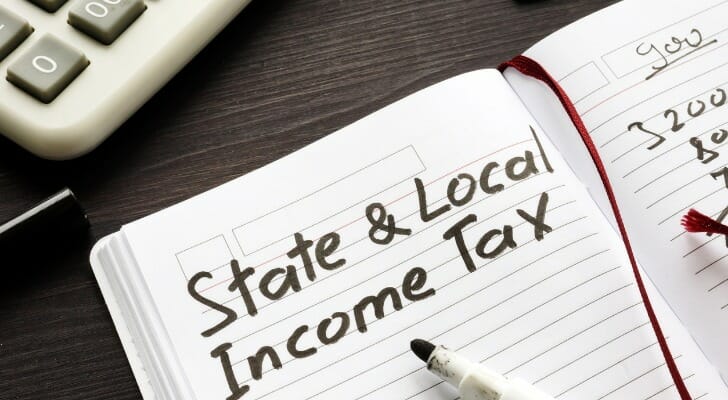
Opening your tax return to discover you owe state taxes can be an unwelcome surprise, especially if you were expecting a refund. Many taxpayers find themselves wondering, “Why do I owe state taxes?” when they’ve had withholdings throughout the year. The answer often lies in a combination of factors unique to your financial situation and your state’s tax regulations. Perhaps your withholdings weren’t properly calculated, you experienced a significant life change like marriage or a new job, or you earned income that wasn’t subject to automatic withholding. Some states also have different tax brackets, deductions, and credits than the federal government, creating discrepancies between what you might expect and what you actually owe.
A financial advisor can help you avoid paying more than you need to the state and federal governments.
State Taxes vs. Federal Taxes: What’s the Difference?
Both state governments and the federal government can collect income tax, as well as other types of tax. But they aren’t exactly alike.
First, federal taxes apply to everyone, regardless of which state you live in. While there are some exceptions, the IRS requires most people to file a tax return. The information you provide on your federal tax return determines what you owe in federal income tax.
So what determines if you owe federal taxes or get money back? If you paid too much in taxes during the year through payroll withholdings, then you may get a refund. If you paid too little in withholding then you may owe additional tax.
If you live in a state that assesses income tax, then you’ll need to file a state return along with your federal return. This return determines what you owe in state income taxes, based on your income and which tax deductions or credits you claim.
The tax bracket you land in at the state level can differ from your federal tax bracket, which is one reason you might owe state taxes but not federal. Again, whether you owe state taxes or get a refund can depend on how much you paid in tax throughout the year.
Why Do I Owe State Taxes?
Getting a state tax bill may come as a surprise but there are several reasons why you may owe money, versus getting a refund. Here are the four most common reasons that you might owe state taxes:
- State Taxes are Different: Again, the first thing to keep in mind is that state and federal tax laws and tax brackets work differently. If your income changed significantly and you earned more than in previous years, this could push you into a higher tax bracket at the state level. That could result in owing more money in taxes.
- Your Withholding Is Too Small: Next, consider what you withheld from your income during the year. Again, withholding too little in taxes can result in owing money to the state tax authorities when it’s time to file. If you haven’t updated your withholdings in some time, you may need to adjust them to avoid owing state taxes in the future. Using an online paycheck calculator can help you get an idea of what you should be withholding.
- Income Change: Changes in income can also affect your ability to claim certain tax credits. For example, say you previously qualified for the federal Earned Income Credit but thanks to a pay raise, you’re no longer eligible. If you can no longer claim that credit on your federal taxes you could lose any similar state tax benefits.
- Your Deductions: The deductions you claim and whether you itemize or take the standard deduction can also affect your state tax bill. Having fewer deductions than in previous years, for example, could mean you have less to itemize. Or you might end up taking the standard deduction instead. Either way, that could affect your state tax liability and cause you to owe more money.
Other situations that may affect your state tax filing include:
- Starting a side job or changing jobs
- Underpaying estimated quarterly taxes if you’re self-employed
- Getting married or divorced
- Becoming a widow(er)
- Having a child
- No longer being able to claim a child as a dependent
- Reporting gambling winnings
- Taking Social Security benefits for the first time
- Withdrawing money from a 401(k) or IRA
- Buying or selling a home
- Reporting capital gains from the sale of investments
- Losing deductions for home mortgage interest or student loan interest because you’ve paid those obligations off
Keep in mind that the same things that can result in you owing more state taxes could also increase your federal tax bill as well. It’s important to work with an expert if you think your federal taxes were filed incorrectly, or if you’re looking for ways to decrease your overall tax bill.
What to Do If You Owe State Taxes

State tax agencies expect timely payments, and ignoring your bill can lead to penalties, interest, and even collection actions. Start by carefully reviewing your tax notice to confirm the amount owed and the tax year in question. Double-check your tax return for errors or missing information that could have led to the balance due.
If you’re unable to pay your state taxes in full, most states offer payment plans or installment agreements. Contact your state’s department of revenue as soon as possible to discuss your options. Setting up a payment plan can help you avoid more severe penalties and keep your account in good standing. Be prepared to provide financial information and propose a realistic monthly payment amount based on your budget.
Timely action is crucial to minimize additional costs. State tax agencies typically assess penalties and interest on unpaid balances, which can quickly add up. Even if you can’t pay the full amount right away, making a partial payment demonstrates good faith and reduces the overall interest you’ll owe. Stay in communication with the tax agency to show your willingness to resolve the debt.
If your tax situation is complex or you’re unsure how to proceed, consider consulting a tax professional or financial advisor. These experts can help you understand your options, negotiate with the state on your behalf, and ensure you’re taking advantage of any available relief programs. Professional guidance can be especially valuable if you’re facing hardship or have multiple years of unpaid taxes.
How to Avoid Owing More in State Taxes
If you want to avoid having to ask why you owe state taxes next year, there are some things you can do to plan ahead. First, check your tax withholding with your employer to see if you’re withholding the appropriate amount based on what you earn, your filing status and the deductions or credits you anticipate taking. If necessary, you can fill out a new Form W-4 to update your withholding.
If you’re self-employed, review what you’re paying in estimated quarterly taxes. Estimated quarterly tax payments allow you to pay into the federal and state tax systems through the year in place of an employer’s withholding. If you owed state taxes because you underpaid your quarterly taxes, then you may need to increase what you pay in each quarter.
Next, consider any life changes that may have impacted your tax filing. For example, if you got divorced or separated and had to change your filing status that can affect how you’re taxed. But you might be able to offset the possibility of a bigger state tax bill by increasing your deductions or qualifying for tax credits.
Speaking of credits and deductions, look at what you claimed for the most current tax year. Then consider which credits or deductions you may claim for the next tax year. It’s possible you may be overlooking valuable deductions that could help you avoid a higher tax bill. Contributing to an IRA, for example, could help you snag a deduction for those contributions. And you may also be able to qualify for the retirement saver’s credit.
Bottom Line

Owing state taxes may be a financial headache, but it’s important to understand the reasons behind a higher tax bill. Depending on your situation, owing state taxes may be a one-time occurrence. But if you’re worried about a repeat next year, talking to a financial advisor or a tax professional can help you find more ways to minimize your tax liability at the state and federal levels. For example, the SALT deduction may ease your tax burden.
Tips for Financial Planning
- Consider talking to a financial advisor about the best ways to manage your state and federal tax filing to avoid a large tax bill. If you don’t have a financial advisor yet, finding one doesn’t have to be complicated. SmartAsset’s free tool matches you with vetted financial advisors who serve your area, and you can have a free introductory call with your advisor matches to decide which one you feel is right for you. If you’re ready to find an advisor who can help you achieve your financial goal, get started now
- Use SmartAsset’s tax return calculator to see how your income, withholdings, deductions and credits impact your tax refund or balance due amount.
Photo credit: ©iStock.com/stevecoleimages, ©iStock.com/maxexphoto, ©iStock.com/designer491